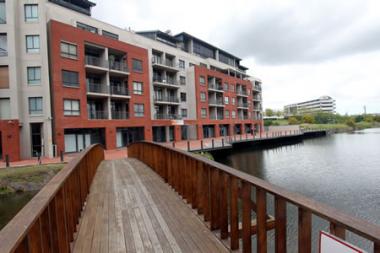New Sectional Title regulations to affect Developers, Owners and Trustees
 The new Sectional Title Schemes Management Act (STSMA) and Community Services Ombuds Service Act (CSOSA) will affect property developers, owners and trustees.
The new Sectional Title Schemes Management Act (STSMA) and Community Services Ombuds Service Act (CSOSA) will affect property developers, owners and trustees.
Property developers, owners and trustees will have to up their game significantly with the new Sectional Title regulation which came into effect starting this month.
With the Sectional Title Schemes Management Act (STSMA) and Community Services Ombuds Service Act (CSOSA) now in effect, SA Commercial Prop News has learnt that certain changes will have to be made immediately in the management of sectional title schemes.
There are some transitional provisions set aside, so that trustees and managing agents have time to make changes, such as the regulations on fees and levy collections, which will commence 90 days from the date of publication.
Also Read: The IFRS 15 Revenue framework to impact SA's Property Market
The provisions of the CSOS Regulations regarding the registration of schemes is 30 days from the date of publication, and the filing of schemes’ governance documentation is 90 days.
There are certain key changes, and if these are remembered, and due processes followed, then body corporates should have no problems with the new ways of managing their scheme, says Michael Bauer, general manager at IHFM.
But the new act is likely to affect how developers construct new sectional title buildings.
According to Mike Spencer, principal at Platinum Global, firstly, developers will need to realise that an extra reserve fund has to be in place for future maintenance – the Ten Year Maintenance Plan. A building with high maintenance – for example a painted building, could put off buyers as it requires higher levies.
Also Read: Black-Managed Property Fund gets nod for R5 billion acquisition of two regional Shopping Centres
"Serious careful consideration will have to go into writing the rules to ensure that they are realistic and enforceable. They will need to incorporate all the changes that are brought into effect by the new sectional titles act and developers could well look carefully at the managing agents that they are appointing to make sure that they can comply with the new act," said Spencer.
The new act will cause a lot more clerical work in that there are numerous reports that have to be supplied to the Ombudsman and this will make management of sectional title schemes a bit more difficult and expensive.
Spencer says there is no clarity yet as to whether the new levies that need to be paid to the Ombudsman will be paid by the body corporate or individual owners. If the former, then it will be an extra burden on the managing agents, he added.
Also Read: Durban’s King Shaka International Airport built without a feasibility study
The biggest change is likely to be the new community Schemes Ombud Service (CSOS) which will be used as a dispute resolution and to control sectional title governance.
"If developers don't set up the body corporate properly, it will be used against them," cautioned Spencer.
Developers will for instance, deviate from the original plans at their peril and will not be able to impose unreasonable actions in meetings.
Also Read: Property groups shifting to develop light Industrial Properties
Low levies to attract buyers will be prohibited. Adding additions without getting full and proper approval of the body corporate by developers will be a thing of the past as they will be responsible for the cost of rectifying the plans. They will not be able to over-rule the rules of the Body Corporate.
Key Changes to be made are to:
- Establish a reserve fund. At this point the amount that is suggested will be required by each sectional title scheme to be set aside is 25% of the budgeted annual levy figure, i.e. if the levies are to be R100,000 for the year, then a reserve amount of R25,000 must be collected which puts the total for the year to be paid in by owners at R125,000. The aim of this fund is to cover costs of future maintenance and repairs to common property.
- Notify the ombud of a domicile. The chief ombud, local municipality, and local registrar of deeds need to have the domicile registered so that in events of cases being brought against bodies corporate by owners or vice versa, there is one address by which to serve notices. This is also to simplify matters as all three bodies will have the same address registered.
- Assist schemes to recover arrear levies. The regional ombud can be approached to help in cases where trustees are finding it difficult to recover arrear owner contributions.
- Certify changes of levy contributions. When the levy amounts are to be changed (which is usually annually), this must be certified in writing.
- Limit proxies. There will be a limit on the numbers of proxies held per person and a person will not be able to be proxy for more than two members.
- Remedy an inability to obtain either a special or unanimous resolution. In future the chief ombud can be approached to assist in cases where there is a stalemate in achieving either a special or unanimous resolution.
- Assist where there are differing management or conduct rules. In cases where the rules have been substituted, added to or changed, the chief ombud must approve these and a certificate will be issued to that effect.
- Ensure the safe storage and delivery of management and conduct rules. All the rules must be made available at all meetings and given to people who are new to the scheme, whether owners or tenants.
- Keep track of occupancy changes. The body corporate of sectional title schemes must be notified of details of any change of ownership.














